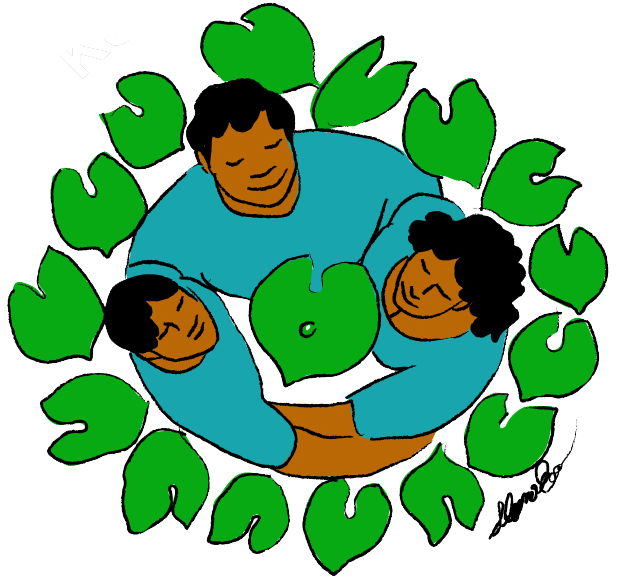Growing Digital Equity
Community members participate in a digital literacy class held by OVC. Photo courtesy of Bernice Musrasrik.
After more than 50 years of experience in grassroots and deeply relationship-based care, KKV experienced entirely new challenges during COVID, with a large and sudden increase in utilization of telehealth and “virtual care”. In response, KKV applied for and received a grant opportunity in the midst of the pandemic, from the Health Resources and Services Administration (HRSA), called “Optimizing Virtual Care”. This two-year project assesses, adapts, and develops best practices for using virtual tools across every KKV clinical department and community program. KKV named the project “Speaking Our Languages” to ground it in KKV’s approach to health. As the grant's timeline is set to end in February 2024, KKV and the OVC team look back on the successes, opportunities, and connections it offered our Kalihi community.
Before the pandemic, providers and patients alike minimally utilized telehealth for appointments. With the grant, KKV wanted to honor its core values of prioritizing deep listening, “connection,” and health equity. “OVC is KKVʻs health equity initiative emphasizing technology,” says Project Coordinator Bernice Musrasrik. “We continue to honor the quality of our relationships as a measure of health, even through virtual means.”
When the grant was first implemented, the OVC team assessed the community and KKV staff to get a better understanding of the needs and barriers pertaining to virtual care and technology. They used this data to invest in technology infrastructure, staff training, and community digital literacy, and to prioritize in-language care. “KKV’s approach to this project was different from other grantees,” said Bernice. “We really wanted to also uplift culturally relevant communications and processes of collecting and integrating community data.”
Through OVC’s research, they found the biggest barriers to virtual care were digital literacy and not having access to a device. OVC held digital literacy classes so that community members could learn the basic functions of the free laptop they received for taking the class. “We also made sure to keep these classes fun and culturally appropriate so that our community members and patients felt welcome,” explained Bernice. These classes are what Bernice says impacted her the most while spearheading the project. “They all were having fun and spending time together deepening connections while learning. It felt good to see them feel loved and supported since technology can be so challenging.” OVC, in tandem with the Economic Agency (Ea) Program, helped to disseminate free phones and discounted phone plans from federal funding opportunities during pop-up events throughout KKV sites. Data collected from surveying a cohort of end-users who received phones during the heart of the pandemic showed that phones were not only used for medical purposes, but also helped patients with other day-to-day issues, like applying for jobs or housing.
OVC also supported KKVʻs efforts to launch new population health software, Lumahealth, with a text-reminder feature for appointments.
“More patients were able to receive text message reminders about their appointments, which led to fewer missed appointments and an increase in utilization and revenue,” said Bernice.
The OVC grant also provided other resources for our patients and community members. For example, through the Blood Pressure Monitoring Program, patients were given machines to monitor their own blood pressure at home. Data collected by the OVC team showed that 89% of those who had access to a machine regularly had steady or improved levels, which led to less health complications. The team was also able to create informational telehealth videos and handouts in different languages for distribution to patients. “It can be hard because [KKV] only has a few interpreters on hand. So, we created these videos in languages like Marshallese to ease that burden.” This highlights the name of the project, “Speaking Our Languages”. Virtual care has become another “language” in which we can connect with our patients and community members.
Through OVC, KKVʻs first Communications team was hired. They help to get vital information out to mass audiences through social media and a monthly newsletter. Through these channels, information is distributed in the many different languages of our community, while documenting and archiving KKV and Kalihi-wide events.
KKV’s efforts to optimize virtual care also extends to our future renovation plans. “The dream is to have private telehealth rooms in our Behavioral Health areas,” said Bernice. “Some people don’t have space in their homes to have a private conversation, which we learned from the pandemic, so we wanted to offer that safe place at KKV.”
The OVC grant is set to end in February 2024. But Bernice says everything that the grant offered and helped KKV with is everlasting. “All aspects of the project are sustainable, even without funding. What KKV has accomplished and learned during the era of Speaking Our Languages will serve as Kōkua Kalihi Valleyʻs digital equity initiative and approach to technology.”





